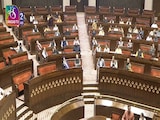Electricity is being restored in Pakistan after a nationwide blackout and Prime Minister Shehbaz Sharif has ordered an investigation into the grid failure that's added to the country's struggle with surging energy costs.
A vast swath of the 220 million population were left without power after the national grid failed on Monday morning, forcing hospitals to switch to back-up generators and causing major disruption to mobile and Internet services.
Work to restore connections continued into the night in cities including Karachi and Lahore, extending the outages in many locations to beyond 12 hours amid plunging temperatures.
Sharif has ordered a probe into the latest blackouts, Energy Minister Khurram Dastgir Khan told reporters late Monday. Low power demand had increased the "vulnerability" of the system, and a "thorough investigation has begun that will consider all possibilities," he said in a Twitter post.
Pakistan has made little progress in upgrading aging electricity transmission infrastructure despite repeated recent outages, including a major failure of the national grid in January 2021.
A global squeeze in energy supplies following Russia's invasion of Ukraine has hit Pakistan hard, raising prices of fuel imports and exacerbating the nation's difficulties with soaring inflation and dwindling currency. Conditions for funding from the International Monetary Fund include a further hike in energy prices.
Rolling blackouts and fuel rationing have been in place for months, and a recent series of proposals aims to cut power demand by about half. Public sector employees have been requested to work from home, while shopping malls, markets and restaurants are being asked to close earlier than usual.















